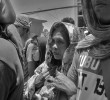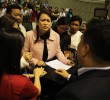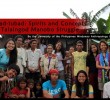By PROF. MAE FE ANCHETA-TEMPLA
Davao Today
Typhoon Pablo has brought to our very eyes the broad range of issues relevant to disaster response. Issues of intervention and actions for the affected grassroots communities in the provinces of Compostela Valley and Davao Oriental have been put to further scrutiny.
But who are these people who survived the historic super cyclone in the Davao region in the first place?
From a five-year stint in an interfaith social development institution that caters to the needs and rights of the three peoples in Mindanao, I found myself fully immersed with the lowland settlers, Moro and indigenous peoples. In particular, I had the chance to work with local leaders of the organized areas heavily hit by Pablo.
Prior to typhoon Pablo, some of these communities have thrived on a livelihood dependent on commercial plantations of bananas, coconuts, throw-outs of commercial logs, small-scale mining, rattan-ripping and small food production. Self-help organizations mark the growth of these communities, from banana plantation unions to the formation of peasant women, youth and indigenous peoples organizations.
Support mechanisms for their continuing education and the systematization of community- building for self-sufficiency are already in place. Noteworthy is the setting up of alternative learning centers both for children and the adults. These initiatives speak volumes of the kind of leadership these people have cultivated in the face of the state’s inadequate delivery of social services to the upland communities.
Taking care of their people is embraced by the entire membership of each formation. A sense of empowerment lies in the level of organization they have reached and to a large extent, action exhibited dwells on handling their local issues for a just share of their labor.
Not until the Pablo victims reached the forty days of their status as flood-affected people, their capacities to assess their situation for a strategic action was portrayed in a bold and daring mass action when they occupied the streets of Montevista National Highway in January 15.
Such a huge mobilization of more than 5,000 individuals generated diverse reactions from the broad spectrum of development practitioners and communities of local, national and global development organizations notwithstanding the officials of national and local bureaucracy including the police and military.
But psychosocial dimension of disaster response speaks of people’s mobilization as an expression of a people bouncing back towards normality. It should be examined by practitioners in the helping profession that levels of coping are appreciated from physiological to psychological and social.
To decide to move out of the danger zones is a manifestation of a physiological coping such as evacuation. Rooting out the issues and problems behind the disaster and understanding their connectedness is a sign of psychological coping. And organizing actions for a better deal of their situation is a step towards social coping. Petition-making and taking actions to a public attention, the state for that matter, is a higher level of social coping.
The scenario that was created by the January 15 people’s mobilization along the Montevista-Monkayo intersection displayed a conscienticized collective action built upon a continuing education among the marginalized and deprived people. It was organized by the alliance of Pablo survivors’ collectives – the Barug Katawhan (People Stand Up). It was not a tiny piecemeal stuff as it was a big one, a society’s concern on dealing with the survivors of a social disaster.
Yes, motor-riders were stranded but the action team leaders were able to persuade them to understand their predicaments and social demands. Specifically, one of the drivers of the stranded log haulers allowed the hauler to serve as the improvised platform where the battery of speakers from various Pablo affected sectors took turn narrating the issues confronting them in the relief distribution and the dynamics of policies in logging, land-use-crop-conversions and extractive destructive large-scale mining that contributes to Pablo devastation.
The people’s action chiefly focused on two concerns: quality of direct service delivery in times of disaster and understanding the dynamics of climate change locally, nationally and globally which the organic intellectuals among the farmers, plantation workers and indigenous peoples articulated in a profound call for climate justice.
This is a serious material for planning a psychosocial intervention, indeed, if I may say so as a social work practitioner and educator for development. Following a crisis, people commonly experience a loss of confidence in the norms, networks, and mutual trust in the society that is supposed to protect them and provide for interaction between themselves and institutions. This feeling has been defined as a ‘loss of place’ (Perkins & Long, 2002). This concept is used as the underlying basis for developing psychosocial support activities that aim to re-establish a ‘sense of place.’
Moreover, rebuilding communities which have had a strong structure of support is dependent on the first level of response: at the relief phase, that is, the provision of basic services for the physiological and physical needs. When this is unmet, the psychosocial problems multiply.
Importantly, and most critically notable is that the degradation of the natural environment is a big loss that prompts the organized masses to launch an equally historic mobilization-cum-public policy advocacy-campaign in the midst of a discriminatory, ethically marred, donor-driven disaster response.
Again, such people’s initiative is an indication of social coping, misinterpreted because of prejudices, elitism in relief services, conservatism and red scare. It speaks of many tenets in the human potentials, human rights and social justice. A threat of a legal action against the organizers and the support network adds to the victimization, eroding survivorship capacities and unresponsive to the state of psychosocial well- being of the Pablo affected population.
Prof. Mae Fe Ancheta-Templa is a women and children rights activist, social worker, peace advocate and chair of the Social Work Program of the Assumption College of Davao, Southern Philippines. Her fields of interest in research include gender, women, children, Moro and indigenous peoples, psychosocial help, community organization, indigenous social work and social administration. She was a research fellow at the University of Cape Town, South Africa.

![[STANDPOINT] Illegal drugs and the NIMBY mindset](https://davaotoday.com/wp-content/uploads/2016/09/Mags-Maglana_UPMIN-Sept.-20-110x100.jpg)








